Ted Kaczynski
“I have no idea what YouTube is”
In 2010, students at small Alabama college wrote to Kaczynski asking him about his views on the power of the Internet, which he was thrilled to discuss even though he’s never used it.
Letter #1
...
Letter #2
...
Letter #3 — From Ted to Dr. Murphy — October 25, 2010
TED KACZYNSKI
to
DR. MAUREEN KENDRICK MURPHY
Dear Dr. Murphy:
Thanks for your letter of October 13, which I received on October 20. I’ll try to answer your questions.
You ask whether I know of any other colleges or universities that use ISAIF as a text for a course or as a platform for critical thinking. I’ve occasionally received information (not necessarily reliable) to the effect that ISAIF was being used in a course at some college or university, but I have definitive knowledge of only one institution that has used ISAIF in the recent past: Dr. David Skrbina teaches a course in the philosophy of technology at the Dearborn campus of University of Michigan, and he has used ISAIF in his course. I assume he will use it again the next time he teaches the course. Dr. Skrbina, by the way wrote and introduction for Technological Slavery.
At the end of your letter you mention an article in The Atlantic by Walter Isaacson, and you ask, “Who will decide what [information] is important and useful, and how would one assign a price to it?” I’m not sure whether this question is addressed to me or whether you only meant to indicate the question that Isaacson considered in his article. In any case I don’t have much to say in response to this question, because I know very little about the enterprises involved in the dissemination of information. I’ll only hazard a guess that the price of information will be determined by what are called “market forces”.
Now the big question. You ask: “Do you think the power of an individual’s personal comments and beliefs posted on the internet can supersede that of large organizations so that an individual might one day theoretically have more influence than do large organizations?”
Here again I’m handicapped by my lack of the knowledge of the Internet. I have never had direct access to the Internet; I know only what I read in the print media and what people on the outside write to me, or what I can infer from Internet articles that they send me. So my answer to your question will be based mainly on general notions about the effects of the dissemination of ideas rather than on any specific knowledge of the Internet.
You write: “We have noticed that seemingly insignificant individuals are able to garner huge audiences (on the Internet and/or You Tube{1}) for expressing their views, singing, or entertaining others. These ideas often go ‘viral’ in a matter of minutes, but they are seldom intellectual ideas.”
It sounds as if the phenomenon you refer to are what scientologists call “fads” or “crazes”. Fads and crazes are briefly discussed in the Encyclopaedia Britannica article “Collective Behavior” (15th ed., 2003, Vol.16, pages 558–59), and are discussed at much greater length by Neil J. Smelsen, Theory of Collective Behavior, Macmillan, New York, 1971. Fads and crazes are usually harmless and ephemeral phenomena that serve only to entertain the people who participate in them. Fads and crazes can occasionally have dangerous consequences (e.g., the anti-Semitic outburst mentioned in the Britannica article), but with its powers of propaganda and of physical coercion the technoindustrial system seems to be consistently able to prevent these occurrences from getting out of hand. Moreover, even if a fad or craze did totally escape the system’s restraints and have serious lasting consequences, it would probably be something like a random phenomenon, not something its initiator could predict or control.
Financial crazes are a possible exception. I don’t know enough about economics to venture an opinion as to whether major, long lasting economic phenomena such as the Great Depression of the 1930s or the current recession could be described as results of the financial crazes, but a financial craze can certainly cause many people to lose a great deal of money (e.g., the South Sea Bubble; see the Britannica article), and I can well imagine that a skilled financial manipulator might be able to use the Internet to start a craze in order to profit from it.
Apart from the foregoing, I find it hard to imagine a single individual or a small group of individuals, solely by posting ideas on the Internet could exert a purposeful influence outweighing that of large organizations; and I mean an influence not merely on superficial phenomena such as fads and fashions, but influence on the decision of important questions that affect millions of people; for example, whether to continue offshore drilling for petroleum, how to reform the healthcare system, or what to do about illegal immigration.
I’ll give my reasons for this opinion, and add some reservations, further on. But first I want to point out that even if a few rare individuals could exert a decisive influence via the Internet, that would not be very important in relation to the question we discussed earlier, namely, whether the Internet enhances personal freedom__ meaning personal freedom for people generally, not just for an occasional exceptional individual. Let’s assume it’s true that in rare cases an individual, solely by posting his or her ideas on the Internet, can exert an influence on important issues that outweighs the influence of large organizations. Still that does nothing for the millions of other individuals who would wish to exert an influence on the same issues but cannot do so.
The nature of technoindustrial society is such that decisions have to be made that affect large numbers of people. If a decision affects a million individuals, then each individual can have, on average, only a one-millionth share in making the decision, See ISAIF, paragraph 117. Suppose for example that the question is whether, or how much, to raise property taxes in Cook County, Illinois in order to improve the school system. Since Chicago is located in Cook County the question affects several million individuals, and obviously only a minute fraction of that number can have a significant influence on the decision that will be made. Let’s assume the question is to be decided by referendum. The only individuals who normally will have a significant influence over the decision will be a handful of people in positions of power, such as public officials, leaders of political parties, and officials of any corporations, labor unions, or other large organizations that may donate enough money to the political parties to be entitled to have their own views taken into account. Let’s say that 5,000,000 voters will be affected by the decision and that there are just 50 individuals among them who will ordinarily have... more influence over the decision than they get from possessing a single vote among 5,000,000. That leaves 4,999,950 people who individually have no perceptible influence over the decision.
Now let’s assume that a single individual among those 4,999,950 could conceivably use the Internet to overcome the influence of the large organizations involved and have the question decided according to his or her preference. That still leaves the other 4,999,949 individuals without any perceptible influence over the decision.
I have to break my letter off at this point because an urgent legal matter came up a short while ago, and I have to deal with it promptly. I’ll continue the present discussion when I can, probably within the next week or so. Meanwhile, please give my regards to your critical-thinking class.
Sincerely yours,
Ted Kaczynski
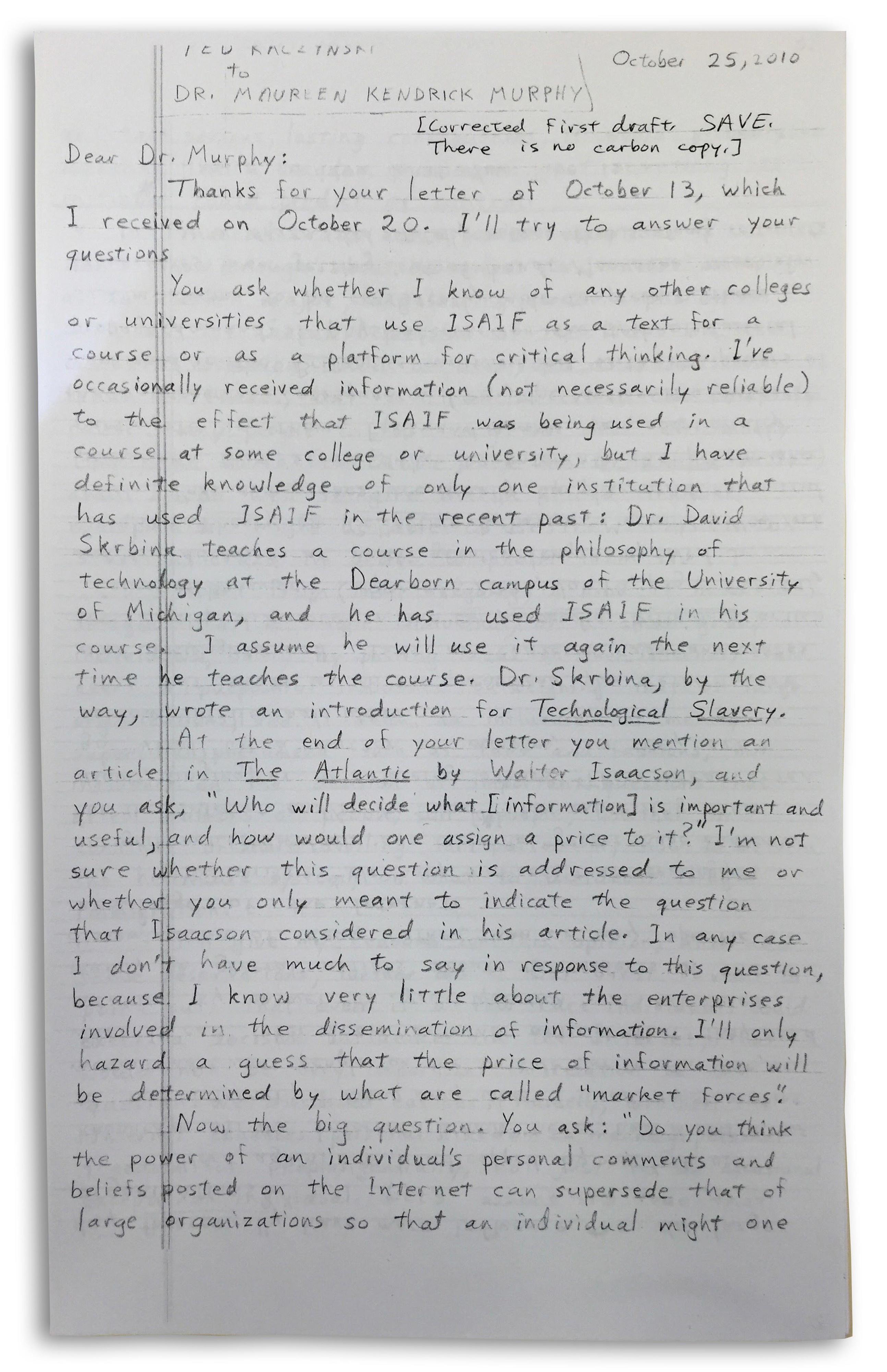
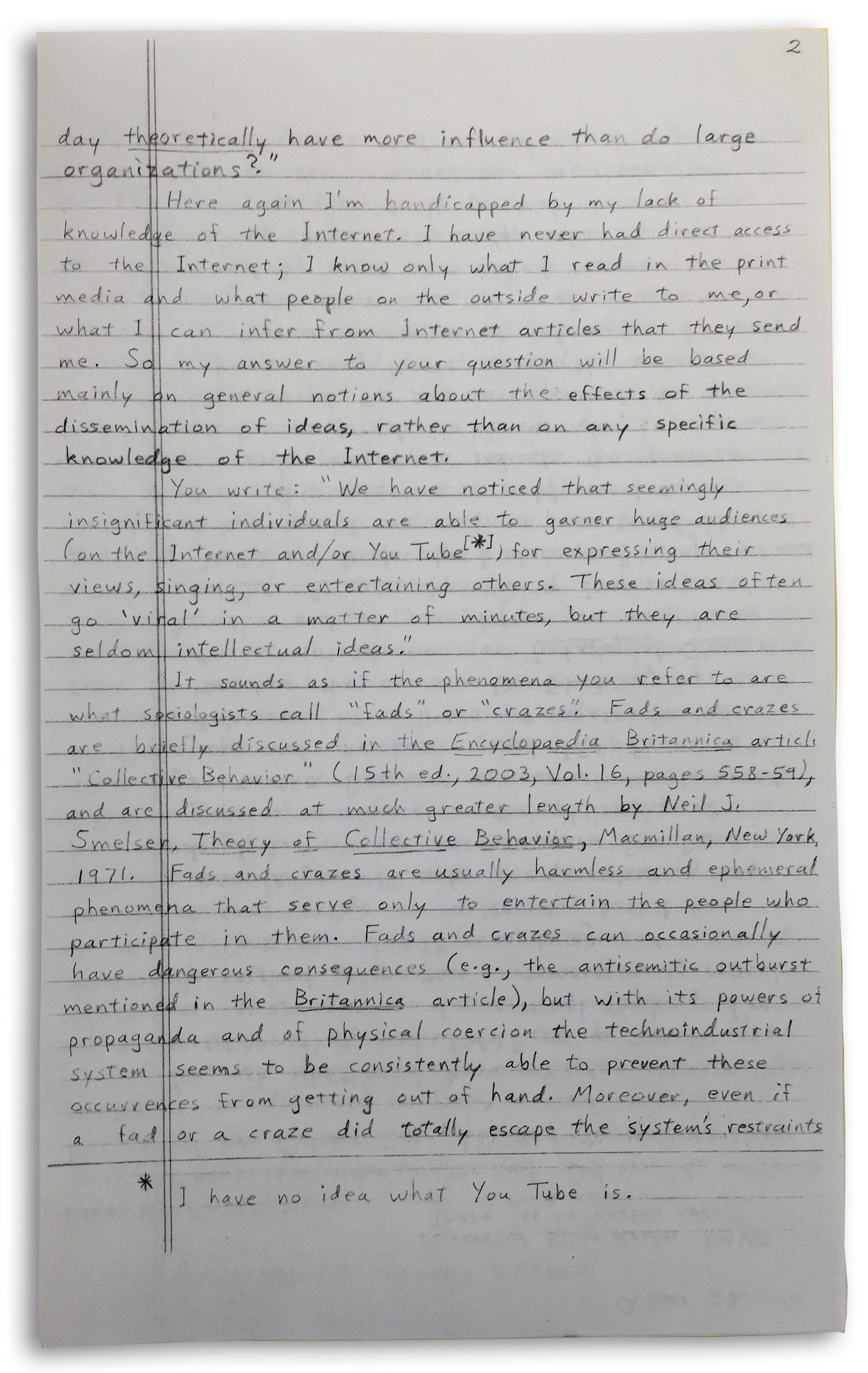
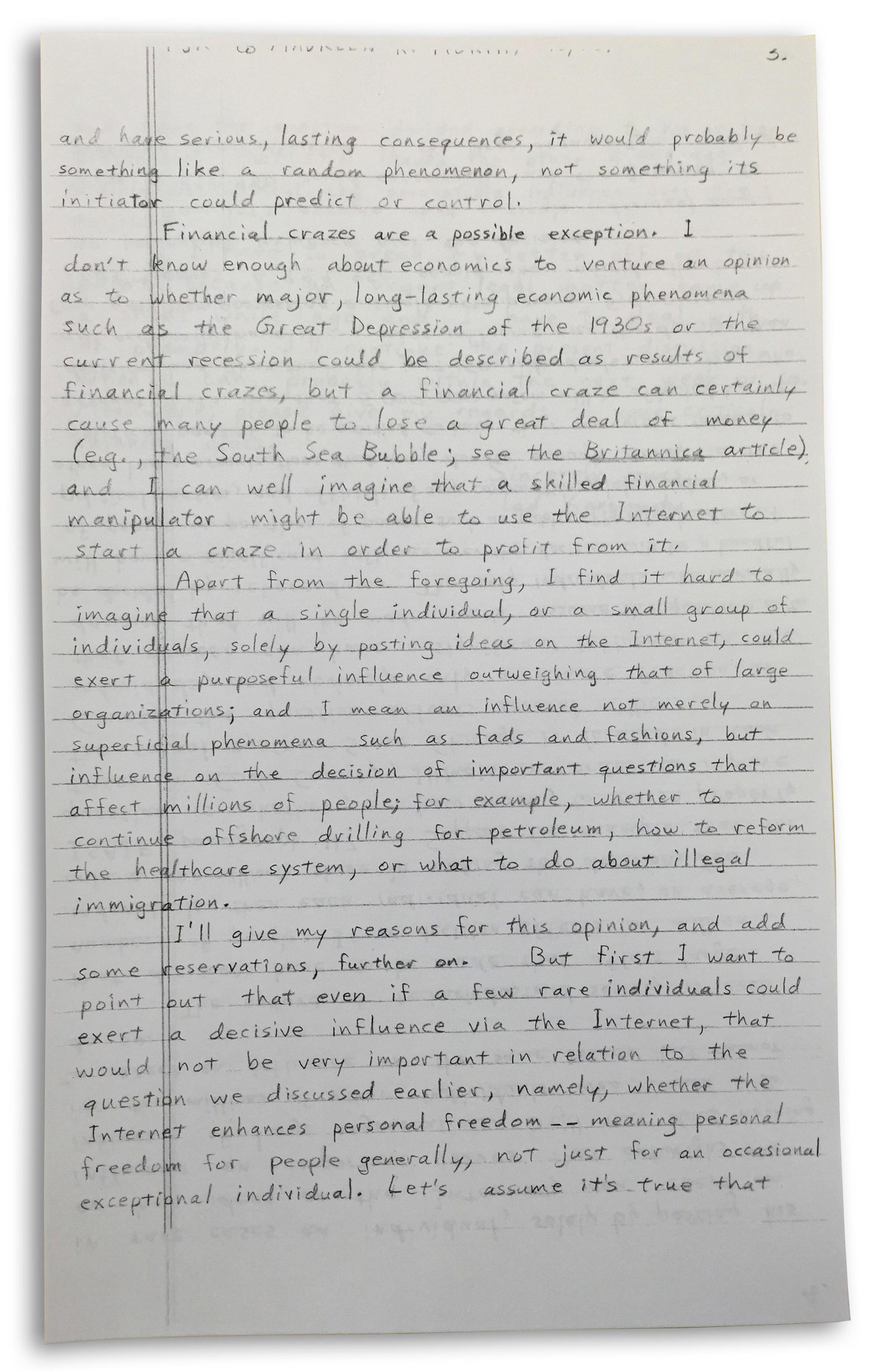
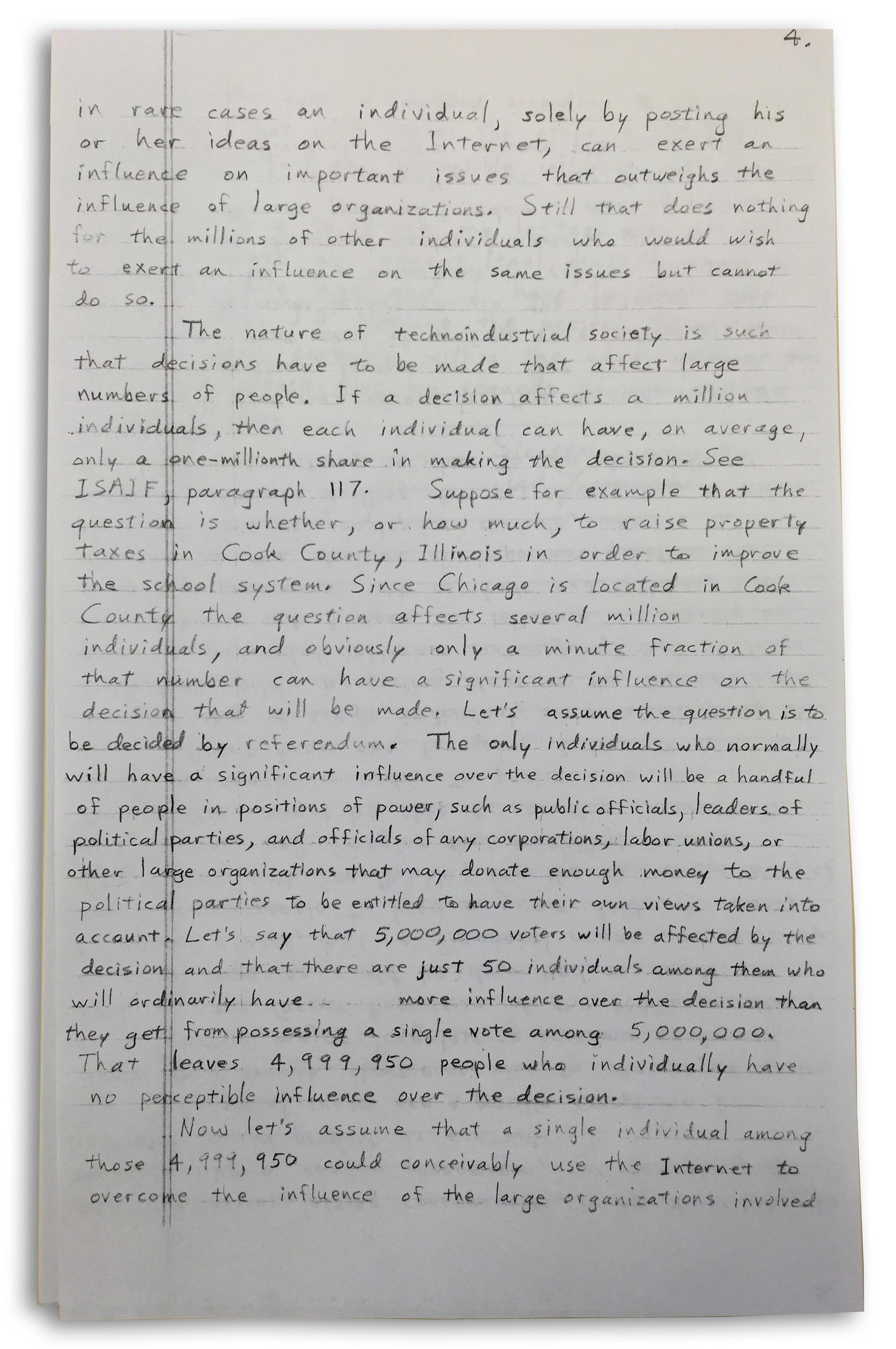

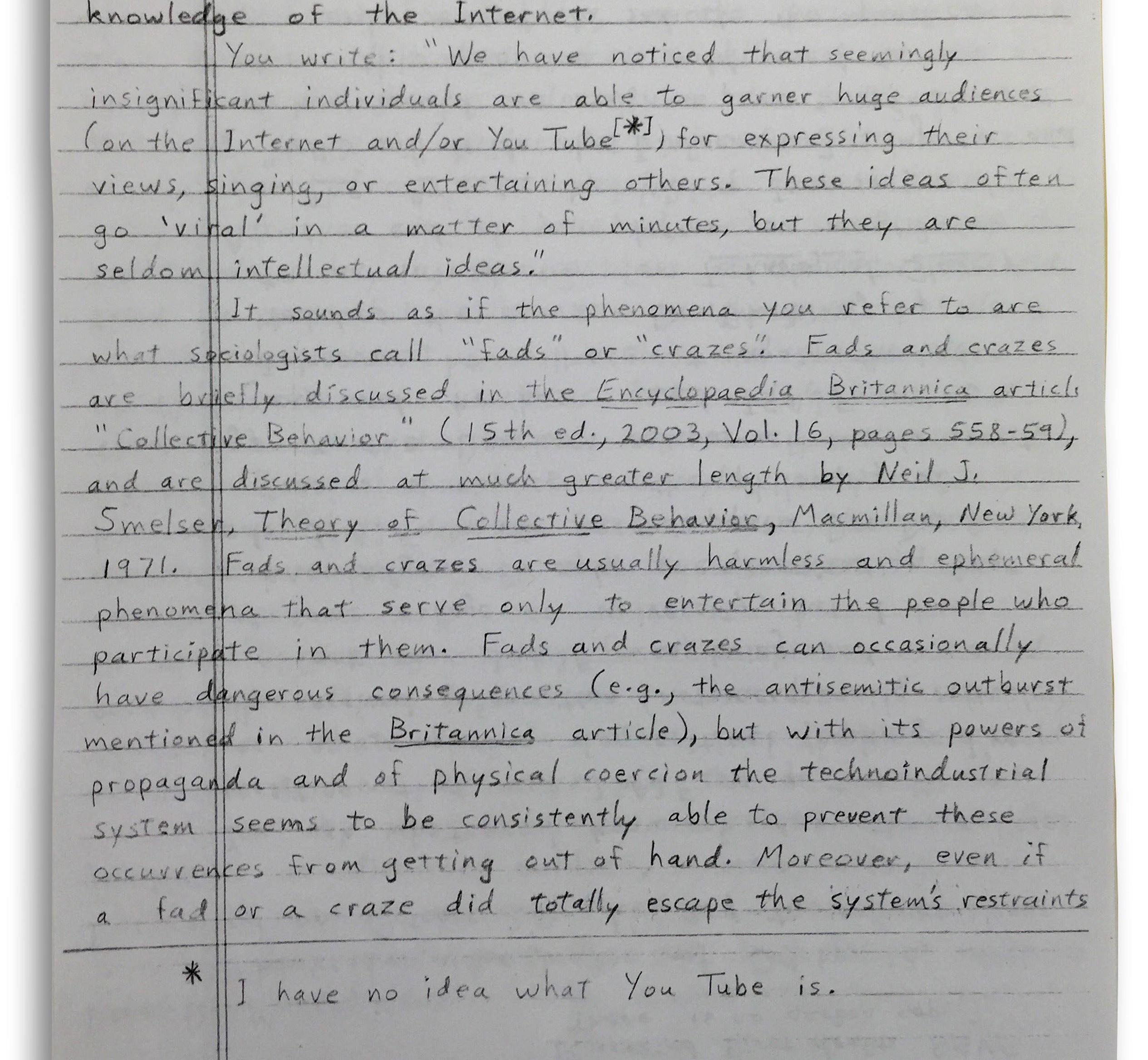
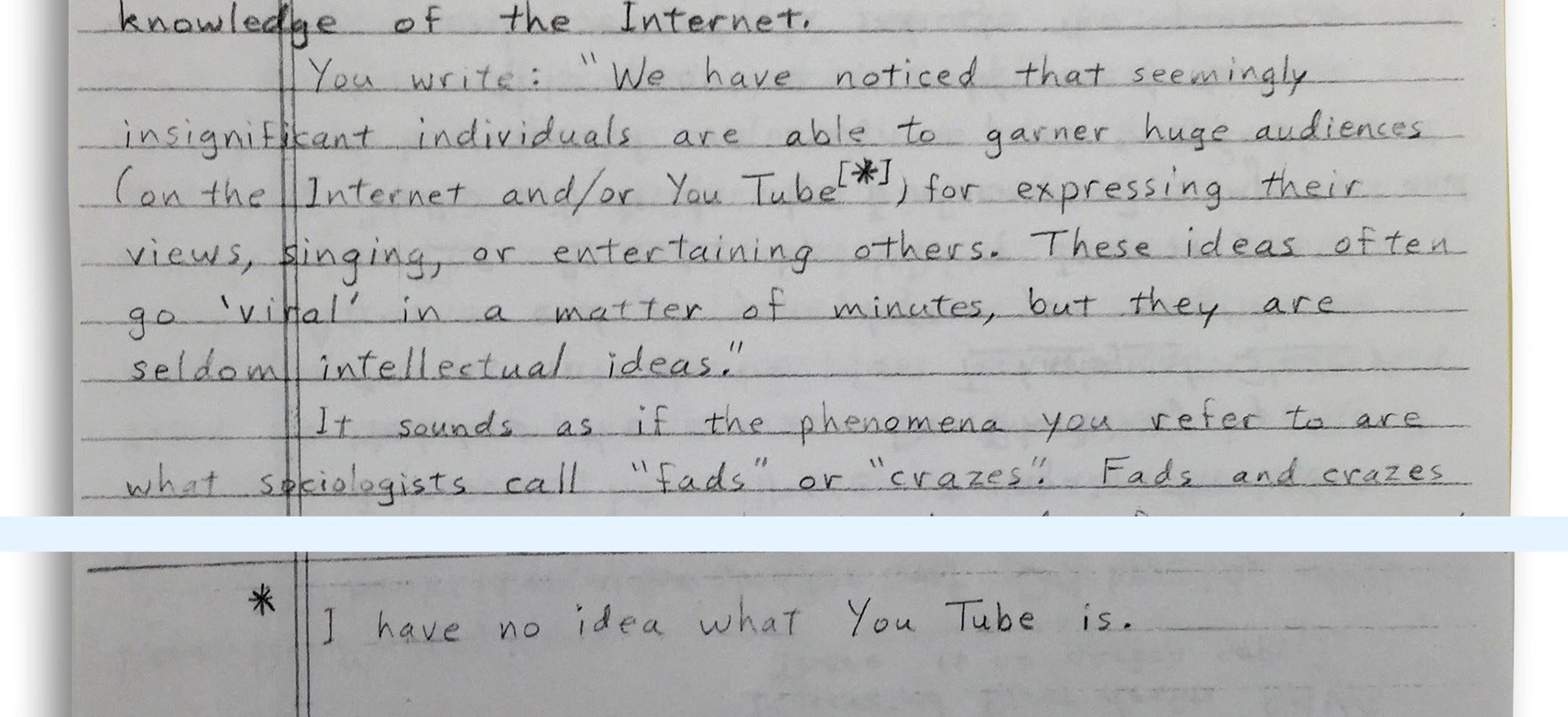
{1} I have no idea what You Tube is.